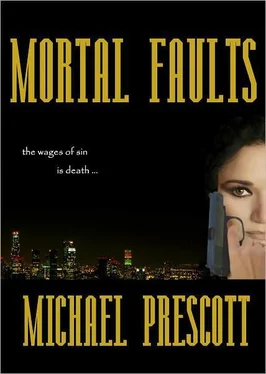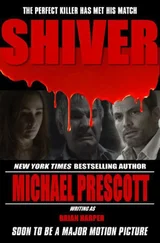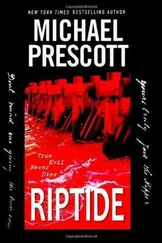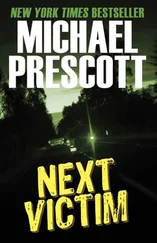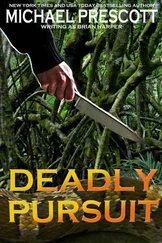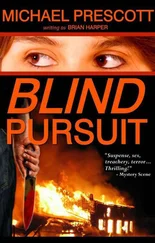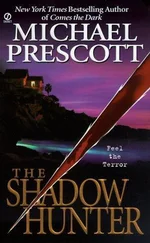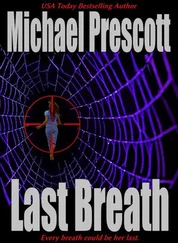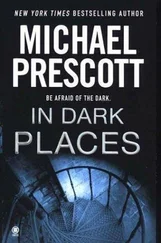Michael Prescott - Mortal Faults
Здесь есть возможность читать онлайн «Michael Prescott - Mortal Faults» весь текст электронной книги совершенно бесплатно (целиком полную версию без сокращений). В некоторых случаях можно слушать аудио, скачать через торрент в формате fb2 и присутствует краткое содержание. Жанр: Триллер, на английском языке. Описание произведения, (предисловие) а так же отзывы посетителей доступны на портале библиотеки ЛибКат.
- Название:Mortal Faults
- Автор:
- Жанр:
- Год:неизвестен
- ISBN:нет данных
- Рейтинг книги:4 / 5. Голосов: 1
-
Избранное:Добавить в избранное
- Отзывы:
-
Ваша оценка:
- 80
- 1
- 2
- 3
- 4
- 5
Mortal Faults: краткое содержание, описание и аннотация
Предлагаем к чтению аннотацию, описание, краткое содержание или предисловие (зависит от того, что написал сам автор книги «Mortal Faults»). Если вы не нашли необходимую информацию о книге — напишите в комментариях, мы постараемся отыскать её.
Mortal Faults — читать онлайн бесплатно полную книгу (весь текст) целиком
Ниже представлен текст книги, разбитый по страницам. Система сохранения места последней прочитанной страницы, позволяет с удобством читать онлайн бесплатно книгу «Mortal Faults», без необходимости каждый раз заново искать на чём Вы остановились. Поставьте закладку, и сможете в любой момент перейти на страницу, на которой закончили чтение.
Интервал:
Закладка:
She tried to get on his good side, assuming he had one. “Believe me, Richard, it’s not that I want to go. Or that I think I can handle things any better than you can.”
“That’s a lie. You always think you can handle everything better than anyone else.”
Apparently his good side was a lost cause. “I don’t see why you’re being so territorial. It seems to me that MEDEA is big enough for both of us.”
“You’re saying you want a piece of this case? Tess, I always thought you were trying to commit career suicide, hanging out in that little cow town when you could be in the spotlight by now. This confirms it.”
“Maybe I just have very poor judgment.” And Denver is not a cow town, she added silently.
“There’s no maybe about it. Look, MEDEA is a tightly held secret. There’s only a handful of people who even know the case has been reactivated.” Reactivated-she noted the word. “However you found out about it, we can’t have you sniffing around and making waves.”
“That’s a mixed metaphor.”
He sighed, a sound of undisguised exasperation. “How certain are you that you’ll be assigned to MEDEA?”
“It’s looking likely.”
“Damn. Well, then you might as well come on in right now.”
She leaned forward, uncertain she’d heard what she thought she had. “Are you inviting me on board?”
“If goddamned D.C. is going to send you anyway, I’d rather take the initiative.”
Now it made sense. “And get the credit,” she said with a smile, “if I come up with a way to clear the case?”
“You overestimate yourself, as usual.”
She asked herself how badly she wanted to help Abby-and ensure she stayed off the Bureau’s radar screen. The answer was: almost as badly as she wanted to piss off the Nose.
“Thanks for having me on your team, Richard. I’ll be there by two p.m.”
“Wonderful.”
“Fax me the case report. I’ll read it on the plane.”
“Why don’t you ask your friend in Washington fax it to you?” he asked in a sullen tone.
“Just do it.”
“If you know so much, you don’t even need to read the case report.” He paused, and she thought she could hear the click of mental tumblers starting to fall into place. “How much do you know, anyway?”
The conversation was veering into a dangerous area. “Enough to know that I’ll regret getting involved,” she said briskly. “Fax the report, but don’t bother arranging a pickup at LAX. I’ll catch a cab.”
She ended the call before he could say anything more, then buzzed her assistant.
“Cancel my appointments for the next two days. I’m going out of town.”
9
The Brayton Hotel had been put up in 1927 and recently renovated at cost of thirty million dollars. The establishment was not so much a hotel as a palace, an opulent monument in the heart of the city. Vaulted ceilings hung over the Spanish Renaissance lobby. Fine carpets absorbed the footsteps of liveried bellmen. The clamor of traffic and people on the streets outside was muted, safely relegated to another world, another century.
Jack Reynolds loved the Brayton. He loved any place that whispered of wealth and status. Whispered was the right word. It did no good to shout about these things. To shout would be vulgar. Men of real power did not shout. They didn’t have to. The same was true of buildings. The Brayton was old money, not nouveau riche. It had no need to prove itself.
He was different from the hotel in that way. He’d been proving himself all his life.
Reynolds entered the rendezvous court, which had once been a library and still offered the hushed atmosphere appropriate to a bookish sanctuary. At a small table in an out-of-the-way corner he ordered black coffee. His security people weren’t with him, but across the room he saw Kip Stenzel reading the latest Newsweek. Stenzel had outfitted him with a radio transmitter the size of the deck of cards, and Reynolds now reached into his pocket and switched it on, saying quietly, “Testing.”
At the far table, Stenzel discreetly tapped his earlobe. He was receiving.
It never hurt to have a second pair of ears at a meeting. And Stenzel could be trusted to keep quiet about whatever Abby Sinclair had learned.
The coffee arrived. Reynolds took a sip and leaned back in his chair. As always when he found himself in a place like this, he couldn’t resist the inrush of contrasting memories from his boyhood. The gray sludge that leaked from the tap in the kitchen sink, which the landlord refused to repair-and now the porcelain mug of Kona coffee, imported from Hawaii and fresh ground in the kitchen. The blare of jungle music from car stereos-and now the Chopin etude playing on hidden speakers. The stink of urine in the stairwell-and now the hint of cinnamon from a scented candle in his table’s centerpiece.
Those were superficial differences. What really mattered was the change in atmosphere, of the very air around him. Growing up, he had been hardly able to breathe-and not only because of the waves of body odor rising from the bums who slept on the stairs, or the stifling confines of the bedroom he shared with two younger brothers. Even in the open air, his lungs had been tight, frozen. He’d been choking, suffocating, every breath constricted by furious despair. At some point in his childhood he heard the expression “trapped in poverty,” and he knew immediately that it named his predicament. He was trapped in the barrio. No exit. No hope.
There were three great turning points in his life. The first came at age ten, when he was ambushed after school by a trio of Mexicans. They were older and bigger than he was, and they took turns pummeling him, pounding him in the face and belly. He could still see the blur of their fists, taste his own sweat, feel the burn of nausea with each new smack in the gut.
But he wouldn’t go down. He took the punishment without surrender. Once or twice he fell on one knee, but always he was back on his feet in time to accept the next blow, and the next.
Two of his attackers backed off, exhausted, leaving only the ringleader still throwing punches and screaming, “Cry!” His broad Aztec face was twisted in fury, his mouth dangling loops of spittle. “Cry, asshole! Lemme see you cry!”
Jack did not cry. He waited until the bully faltered, worn out by the punishment he’d inflicted, and then with some unknown reserve of strength Jack launched a piledriver at the bastard’s jaw. He heard a crack of bone. The Mexican collapsed, blood in his mouth, eyes wild with pain. The other two fled, shouting curses. Jack stood over his fallen aggressor, then kicked him twice in the ribs and walked away. As it turned out, the punch had broken the bully’s jaw, which had to be wired up, his meals fed to him through a straw.
That day he learned his anger could serve a purpose. He could feed off its heat and use it as a weapon. It made him stronger. Other fights followed. Sometimes he was the loser. Most times he was not. But he never backed away, and he never went down easy-and when beaten, he never forgot.
The second turning point came when he was thirteen. A friend of his, who’d been rescued from a beating by Jack’s intervention, invited him on what he described as “a goof.” A goof, as it turned out, was a crime-the robbery of a convenience mart. Jack’s job was to watch for police. He did okay, and got a small share of the money. Other goofs followed. Nothing too serious-no one ever got hurt in any major way, and he avoided arrest, though sometimes narrowly. His activities brought him new respect. He began to realize that the other kids, the ones who never broke the law, were wary of him. They feared him. He liked that.
This was his second lesson. He could scare people. And their fear, properly exploited, would make them do all kinds of useful things. They would empty their pockets for him. They would follow his orders. The girls found him dangerous and intriguing. He lost his virginity at fourteen in the girls’ locker room, where a blond sophomore had brought him for a quick introduction to the mysteries of sex.
Читать дальшеИнтервал:
Закладка:
Похожие книги на «Mortal Faults»
Представляем Вашему вниманию похожие книги на «Mortal Faults» списком для выбора. Мы отобрали схожую по названию и смыслу литературу в надежде предоставить читателям больше вариантов отыскать новые, интересные, ещё непрочитанные произведения.
Обсуждение, отзывы о книге «Mortal Faults» и просто собственные мнения читателей. Оставьте ваши комментарии, напишите, что Вы думаете о произведении, его смысле или главных героях. Укажите что конкретно понравилось, а что нет, и почему Вы так считаете.
